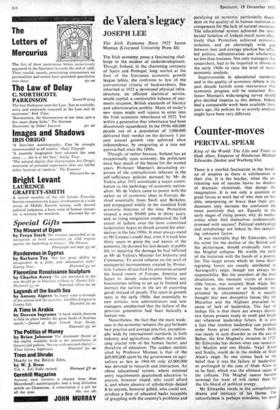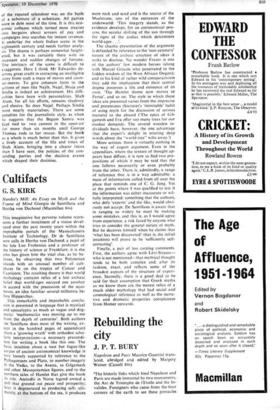Counter-moves
PERCIVAL SPEAR
King of the World: The Life and Times of Shah Alam, Emperor of Hindustan Michael Edwardes (Seeker and Warburg 63s) There is a morbid fascination in the break- up of empires as there is exhilaration in their rise. It is the heyday, when the un- relenting sun of success leaves no shadov, of dramatic vicissitude, that damps the imagination. It is not only a question of great forces at work but of why men no less able, enterprising or brave than their pre- decessors only increase the confusion the more positively they act. Equally in the early stages of rising power, why do medio- crities often find themselves undeservedly crowned with success? Political embryology and morphology are linked by this tantalis- ing unknown factor.
It was inevitable that Mr Edwardes, with his relish for the decline of the British and the picturesque, should eventually turn to the Mughal collapse. He wields the tools of the historian with the hands of a journa- list. The larger errors which let loose disin- tegrating forces are usually attributed to Aurangzeb's reign, though not always his responsibility. But the president of the final dissolution, the innocent victim of irresis- tible forces, was certainly Shah Alam. But was he so innocent or so hopelessly im- prisoned by circumstance? It is usually thought that new disruptive forces like the Marathas and the Afghans prevailed be- cause of lack of leadership. The fact of Indian life is that there are always disrup- tive forces present ready to swell and break 'out whenever leadership falters. It is also a fact that resolute leadership can produce order from great confusion. North India was rarely in such disorder as on the eve of Babur, the first Mughal's; invasion in 1525. Mr Edwardes has shown what one resource- ful Muslim and one Hindu, Najaf Khan and Sindia, could do in the middle of Shah Alam's reign. So one comes back to the belief that it was the failure of leadership, so prolonged in the case of Shah Alam as to be final, which was the ultimate cause of the collapse. The Mughal cancer became terminal for want of will rather than for . the life-blood of political energy.
Mr Edwardes revels in the colourfulness, drama and intricacy of his theme. The colourfulness is perhaps overdone, for most of the reputed splendour was on the basis of a substitute of a substitute. All parties were in debt most of the time. It is this eco- nomic collapse which turned most treaties into bargains about arrears of pay and campaigns into searches for instant revenue. It underlay the whole Indian scene in the eighteenth century and needs further analy- sis. The drama is perhaps somewhat height- ened, but it was certainly there with its incessant and sudden changes of fortune. The intricacy of the scene is difficult to exaggerate. Here I think Mr Edwardes de- serves, great credit in extracting an intelligible story from such a maze of moves and coun- ter-moves. To give coherent form to the actions of men like Najib, Najaf, Shuja and Sindia is indeed an achievement. His diffi- culties have been with personalities. Shah Alam, for all his efforts, remains shadowy and elusive. So does Najaf. Perhaps Sindia most nearly materialises. There are some penalties for the journalistic style, as when he suggests that the Begum Samru was kept tied to two cannon in the open-air for more than six months until George Thomas rode to her rescue. But the book as a whole is much better than this. It gives a lively account of the life and times of Shah Alam, bringing into a clearer focus than I have seen, the policies of the con- tending parties and the decisive events which shaped their destinies,







































 Previous page
Previous page